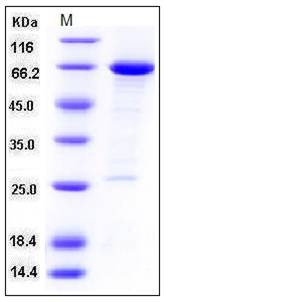Human HDAC8 / HDACL1 Protein (GST Tag)
CDA07,CDLS5,HD8,HDACL1,MRXS6,RPD3,WTS
- 100ug (NPP3918) Please inquiry
| Catalog Number | P10864-H09B |
|---|---|
| Organism Species | Human |
| Host | Baculovirus-Insect Cells |
| Synonyms | CDA07,CDLS5,HD8,HDACL1,MRXS6,RPD3,WTS |
| Molecular Weight | The recombinant human HDAC8/GST chimera consists of 602 amino acids and has a predicted a molecular mass of 68 kDa as estimated in SDS-PAGE under reducing conditions. |
| predicted N | Met |
| SDS-PAGE |  |
| Purity | > 88 % as determined by SDS-PAGE |
| Protein Construction | A DNA sequence encoding the full length of human HDAC8 isoform 1 (NP_060956.1) (Met 1-Val 377) was expressed, fused with the GST tag at the C-terminus. |
| Bio-activity | |
| Research Area | Immunology |Signal Transduction |Transcription Factors and Regulators |Transcriptional Co-Repressors |
| Formulation | Lyophilized from sterile 50mM Tris, 100mM NaCl, 0.5mM PMSF, 10% glycerol, pH 8.0 1. Normally 5 % - 8 % trehalose, mannitol and 0.01% Tween80 are added as protectants before lyophilization. Specific concentrations are included in the hardcopy of COA. |
| Background | Histone deacetylase 8, also known as HDAC8 and HDACL1, is a nucleus and cytoplasm protein which belongs to the histone deacetylase family and HD type 1 subfamily. Histone deacetylases (HDACs) are a growing family of enzymes implicated in transcriptional regulation by affecting the acetylation state of core histones in the nucleus of cells. HDAC8 / HDACL1 is weakly expressed in most tissues. It expressed at higher level in heart, brain, kidney and pancreas and also in liver, lung, placenta, prostate and kidney. HDAC8 / HDACL1 is responsible for the deacetylation of lysine residues on the N-terminal part of the core histones ( H2A, H2B, H3 and H4 ). Histone deacetylation gives a tag for epigenetic repression and plays an important role in transcriptional regulation, cell cycle progression and developmental events. Histone deacetylases act via the formation of large multiprotein complexes. HDAC8 / HDACL1 may play a role in smooth muscle cell contractility. HDAC8 / HDACL1 may be a potential drug target for neuroblastoma differentiation therapy using selective inhibitors, avoiding unspecific side effects. |
| Reference |
